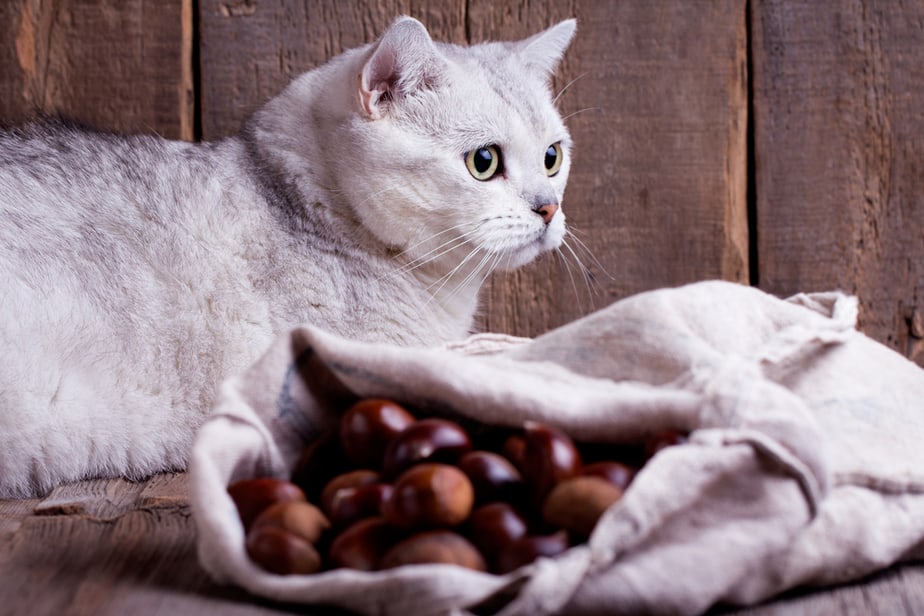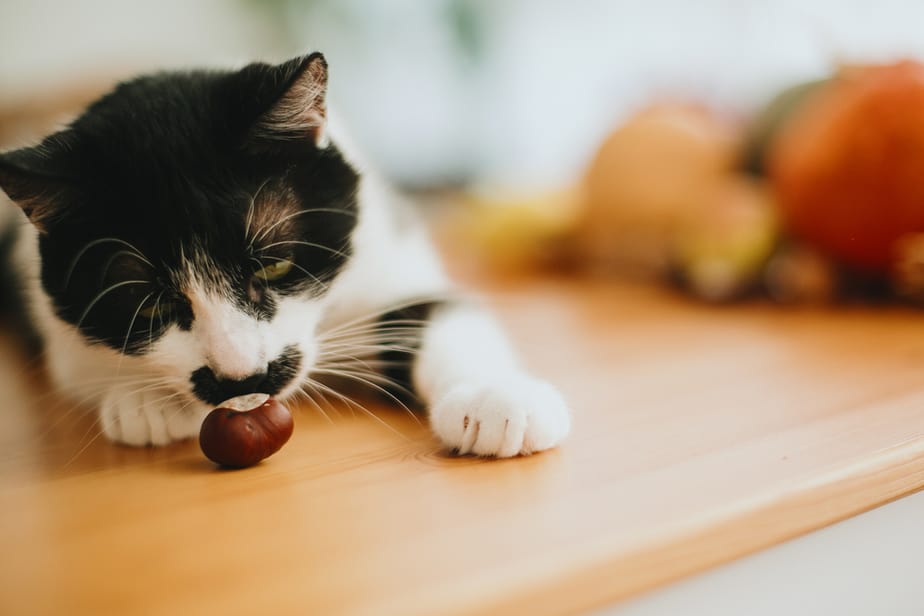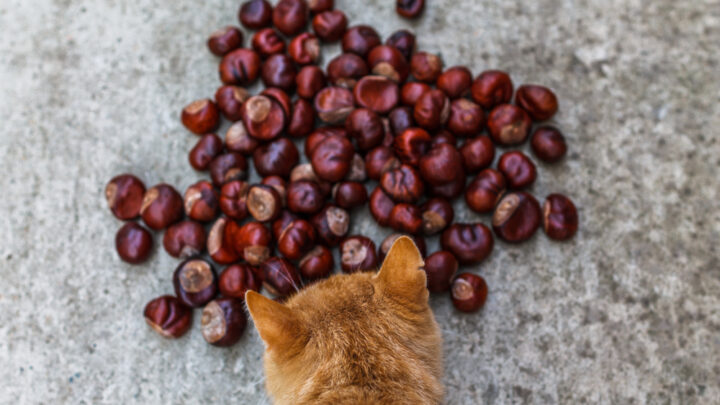Christmas season is just around the corner, and you’ve been catching glimpses of roasted chestnuts everywhere you go. Your precious purrincess feels doesn’t pass up the chance to push them around with her greedy little paws. Oh, no! She’s trying to bite into one! But can cats eat chestnuts?
There’s no need to panic because chestnuts aren’t toxic to cats. If your mischievous monster sneaks in a couple of bites while you’re not looking, she’s not likely to experience any adverse reactions.
Let her have some fun! After all, the love your cat feels for anything that’s round in shape can’t be measured.
But – there’s always a but when it comes to weird food choices your picky eater makes. While an occasional chestnut or two won’t cause any issues for your cat, you shouldn’t include these savory nuts in her regular diet.
Can cats eat chestnuts safely?
First things first, chestnuts are edible nuts of the sweet chestnut tree that grow inside of a prickly shell called a burr. Their soft, creamy white flesh is incredibly popular around the world, especially during the holiday season.
Believe it or not, cats have quite a history with nuts. For example, macadamia nuts are considered toxic to cats because they contain certain compounds that could cause serious damage to felines. Pecans and almonds are rich in oils that could trigger gastrointestinal issues.
Most nuts aren’t recommended for feline consumption, so why would chestnuts be any different? Luckily for your picky eater, cats can eat chestnuts on the odd occasion. Apart from enjoying their peculiar shape, your cat can receive an array of nutritional and health benefits from consuming these nuts.
Just like with any plant-based food, you should only feed it to your furry friend as an occasional treat. Chestnuts, or any other nuts, shouldn’t become a regular part of her diet regardless of their nutritional benefits.
Here are some additional pros and cons of feeding chestnuts to your cat.

Why chestnuts are GOOD
First things first, chestnuts might be great for your cat’s digestion and overall gut health. One serving size of chestnuts contains about 4.3 grams of fiber. Wow, that sounds like a lot, right?
The great thing is that fiber is an excellent ally for constipated pets as it bulks up your cat’s stool and ensures healthy bowel movement.
An occasional nutty treat might also help your cat accomplish her summer body goals. The fiber contained within chestnuts helps your feline friend achieve the sensation of fullness. Not only that, a huge part of this miraculous nut is comprised of water! Dehydration who!?
Chestnuts are packed with potassium, an essential mineral in your cat’s diet. It helps regulate blood pressure, reduces the risk of stroke and heart disease, and ensures proper organ function.
And if that isn’t enough, chestnuts make for a great ally in boosting your cat’s immunity. These nutty treats are high in vitamin C, gallic acid, ellagic acid, alkaloids and many other compounds. The point is that these antioxidants help neutralize the negative effects of free radicals in your cat’s body.
At the end of the day, we all know that a healthy cat is a happy cat, so what more could you ask for?
Why chestnuts are BAD
These nutty morsels are completely safe for your cat, as long as you treat them as an occasional snack rather than a substitute for her regular meals. Cats are carnivores, which means they thrive on meat and animal-sourced minerals and vitamins.
A couple of chestnuts here and there might offer your kitto some additional nutritional benefits, but you shouldn’t go overboard with them. If your cat consumes too many chestnuts, she might experience digestive issues with symptoms like vomiting, diarrhea, and discomfort.
In addition to that, chestnuts might become a choking hazard. If your furry friend loves playing with these nuts while they’re enveloped in their burrs, she might end up biting too hard and choking on broken-off pieces. Rather let her play with a peeled chestnut instead!
It goes without saying, but… If your cat shows any symptoms of digestive distress (or choking) after consuming these nutty treats, you should contact your vet immediately. While most chestnuts aren’t toxic to cats, it’s better to be safe than sorry.

Can cats eat water chestnuts?
Believe it or not, water chestnuts have no relation to regular chestnuts. Water chestnuts are incredibly popular in Asian cuisine because they’re a delicious, crunchy, white… vegetable!
Yes, you read that correctly. Water chestnuts are actually veggies that normally grow in muddy areas. They have a high water content (75%) and humans can eat them raw or cooked.
If you’re wondering whether cats can eat water chestnuts, wonder no more. These crunchy veggies aren’t toxic to cats. Not only that, they offer an array of nutritional and health benefits if eaten in moderation. Don’t let your cat fill up on them because she won’t be able to eat anything else!
There’s one thing you should keep in mind if you’re planning on sharing some water chestnuts with your precious pet. Unfortunately, they can carry a parasite fasciolopsiasis which can attack both humans and animals.
So, make sure to wash them properly before letting you or your cat consume them. That way, you’ll know that you did everything you could to keep your pet safe.
What about horse chestnuts?
Ever wondered whether cats can eat horse chestnuts? It’s important to mention that horse chestnuts are the only exception here. These inedible nuts have a fleshy, bumpy casing covered in warts… and they’re incredibly toxic to cats!
How can you tell the difference between these two types of chestnuts? Both horse chestnuts and edible chestnuts produce a nut similar in appearance. The main difference is in the spiky point.
If it’s completely round, you should steer clear! You’re dealing with horse chestnut. But if it has a point, you and your feline can eat it safely.
If your cat’s a big fan of chestnuts, make sure you choose to do your research before making any changes to her diet. Choose the right type, be mindful of the portion size, and treat it as an occasional snack. After all, your furbaby can push them around all she wants with no repercussions!

